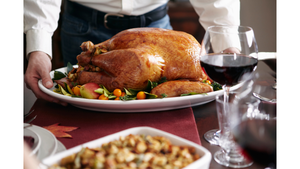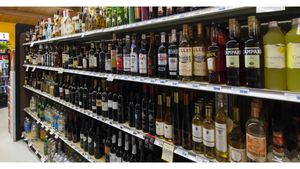The Push and Pull of Private Label 2018-01-01 (1)
By pulling consumers into stores and pushing them away from national brands, private label programs have become an integral part of any successful grocer’s operation.
January 1, 2018
Private brands are very much catching the public eye.
A hot commodity that is no longer seen as an alternative choice but a persuasive reason to choose a specific retailer, consumers are shopping private brands in record numbers—and for good reason.
Many retailers, say industry observers, have done an excellent job using store brands to set themselves apart—notably Trader Joe’s, Kroger, Aldi, Wegmans and Costco—which is why it comes as no surprise that according to the Private Label Manufacturer’s Association’s (PLMA) 2015 Private Label Yearbook, private brands are on an upswing among all major retail channels, as they have been for the past few years. For 2014, the Yearbook shows a growth rate of 2.5 percent for store brands across all outlets.
“What I have discovered in my research is that the number one predictor of retailer success is the health of their private brands,” says Jim Holbrook, CEO of Stamford, Conn.-based Daymon Worldwide. What defines a healthy store brand, Holbrook adds, is that it “has a share greater than average and is growing at a faster than average pace. On a preliminary basis, this becomes the predictor of overall success.”
Increasingly, store brands have become interwoven in the fabric of a store’s bottom line. With a growing impact on a store’s success—store brands accounted for 28 percent of all new dollars entering the grocery channel last year, according to the PLMA Yearbook—retailers have placed a renewed emphasis on managing their brands with a strategic mindset.
“We know that store brands are a fundamental part of the retail strategy,” says Brian Sharoff, president of PLMA, based in New York. “It has a solid base among consumers, it grows as a result of both external factors like the economy, and internal factors like the retailer that is committed to its store brands.”
Retailers with successful store brands no longer look at them as simply a moneymaking proposition. Merchandising private label products that will actually entice the consumer as much as, and in some cases more than, the national brands is a key factor in the strategic management of store brands. Holbrook adds that today, margins are not good enough.
“Retailers need to adopt the full spectrum of business management—marketing, quality, price, value, selection, assortment, design—all of those things have to come to bear,” he says.
“The successful retailer can enhance image and the bottom line by creatively making private brand an important part of all major promotions,” agrees Mike Hackbarth, vice president private brand and customer demand for The Fremont Co., a producer of private brand ketchup products.
In order to get the entire equation right, observers say retailers must partner with a product vendor capable of meeting and exceeding their specific needs. “Those retailers that truly create manufacturing partnerships and better quality goods are the retailers that the consumers buy from and the other retailers look up to,” Hackbarth says.
Millennial Must-Haves
Most surveys and studies point to the Millennial generation as the consumer driving the surge in demand for store brands, so it is not surprising that they are the segment of the population that find store brands to be of an even higher quality than national brands.
“A good part of the Millennial generation became independent during the recession,” says Susan Lambert, business development manager for Portsmouth, Va.-based Massimo Zanetti Beverage USA. “This group in general is less brand loyal and more likely to look for premium products with reasonable pricing.”
This could be a part of the reason that observers do not foresee the momentum that store brands have achieved to slow down anytime soon. “What is really telling to me is that the Millennial group—the future—they believe that private brands are higher quality,” Holbrook adds. “That does not bode well for national brands.”
Retailers have accepted that the Millennial shopper—known for its want it all, now, mentality—is certainly not going to compromise on quality. However price is important to them, too. The PLMA Yearbook reveals that by choosing store brands, shoppers saved $27 billion last year, and one-third on a typical supermarket trip.
“I think people are realizing that the quality is there and they can still save money, so even though the economy is improving people don’t see a big advantage of going back to the branded item,” says Paul Saneholtz, director of private label sales for Mississauga, Ont., Can.-based Furlani’s.
Better-for-You, Better for Your Brand
Even though Millennials are gravitating toward store brands more than any previous generation, and quality has improved, there is still plenty of room for growth throughout the store. Health and wellness is a catchphrase seen snaking through grocery aisles for years now, but it is a concept that continues to attract attention and expand its boundaries. To that end, observers feel that health, wellness and better-for-you targeted products from within store brands are likely the biggest opportunity for future growth.
The top private label categories echo this sentiment. Seven out of the top 10—milk, cheese, bread/baked goods, produce, eggs, deli salads/prepared foods, packaged meat, fresh meat—categories by dollar volume fall into the realm of fresh foods, typically store perimeter sales, which are seen as healthier by nature.
Part of the opportunity comes from the perceived notion that food products from national brands are not good for you, observers say. Major CPG companies have been associated with being over processed, using too much sugar, sodium, artificial ingredients and more—leaving room for store brands to start from scratch and in a sense, rewrite the narrative.
An oft-cited example of a store brand seizing the day when it comes to health and wellness is the success of Kroger’s Simple Truth line. “Simple Truth was a corporate priority,” Holbrook says. “They got the assortment, the price points and the quality right, and then they put marketing muscle behind it. They didn’t just put the products out there and hope they sell.”
Mark Coleman, vice president retail division for Catania-Spagna, the Ayer, Mass.-based maker of private label edible oils, says that he has seen a spike in demand for organic oils. “Consumers look for better ingredients and demand cleaner labeling,” Coleman says. “The consumer is looking for open disclosure on GMOs and we continue to see non-GMO oil requests for canola oil, soybean oil, and others.”
Organic is seeing sustained growth throughout the store; retailers who have incorporated private brand organic options into their sets are reaping the rewards, while those yet to make the change have some catching up to do. “Natural products have continued to enter and/or replace traditional products throughout the stores,” says Hackbarth. “In many categories, like ketchup, sales are dominated by the private brand organic SKUs.”
It is not just personal health consumers are concerned about—in many cases, their desire for “better” extends to the environment as well. “Shoppers are looking for ‘better-for-you, better-for-the-world’ products and this impacts what they buy,” Lambert says. “As a result, organics and other certified traceable ingredients are trending well. Consumers are also saying that packaging waste is playing a bigger role in their purchase decision. All of these macro trends can be leveraged in a private label program, with the added benefit of a strong price/quality relationship.” To satisfy this need, Massimo Zanetti’s single-serve coffees now come in 100 percent certified compostable pods.
The perception of national brands as unhealthy may be a part of the reason that many observers are pointing to their overall decline. A staggering statistic in a survey done by Catalina, A Tough Road to Growth: The 2015 Mid-Year Performance Review, reveals that in the past year, 90 out of the top 100 national brands have lost share. Naturally, this opens up significant opportunity for strong store brands to step in and capture the consumer—and in many cases, this is what has happened.
“National brands are on the decline and the mass market in which they operate is also on the decline. Those are factors that are really social factors, they have to do with demographics and mass communication,” Sharoff says.
How the retailer reacts to this decline has the potential for the biggest impact. Sharoff adds that when the retailer gives a consumer more choice and innovation from its store brands, it leaves them more satisfied than wasting shelf space with undesired national brands that are not being sold.
Despite the success store brands have achieved, there are many challenges that retailers still face, like how to effectively integrate them into their sets. “What we recommend to retailers is to do category management, but do it objectively, and begin with building the category around your private brand first,” says Holbrook. “Maximize the opportunity of your private brand first, and then build around that with the other brands.”
Making sure private brands offer the core items in each category is key, observers say. For example in frozen bread, Furlani’s Saneholtz says that retailers should be sure to have toast, cheese toast, loaf and a breadstick offering. However, he adds, “if the retailer is trying to expand out, it could gain some more incremental sales from some of the newer items.” Among those that Furlani’s has released to positive feedback are garlic knots and a stuffed breadstick.
Though national brands are on a downward spiral, store brands sometimes still struggle to compete in some areas. By premise, store brands do not spend the money on advertisement and promotion that national brands must, which is how they are able to garner such strong sales margins on the products. However, that does not mean that store brands do not feel the pressure to maintain a flow of innovative new product releases that are just as good, if not better than, what the national brands are coming up with.
Ultimately, the retailer is the determining factor of its own fate. “The attitude of consumers is completely dependant on the attitude the retailer has toward their private label,” Sharoff says. “It just has to show the consumer that it is even better than the national brand. When you do that, the perception changes.”
Store Brand Showdown
There is perhaps no stronger testament to the success of the private label business than just how busy the Private Label Manufacturer’s Association (PLMA) upcoming trade show will likely be. PLMA’s, “Store Brands and Beyond,” will be held Nov. 15-17, at the Rosemont Convention Center in Rosemont, Ill.
The 2015 show marks 35 years of industry growth, say PLMA officials, who add that all signs point to this event being its biggest to date. More than 2,700 exhibitors are expected to fill the convention center, with more than 5,000 visitor registrations from retail buyers and executives.
Here is a look at what there is to see from just a handful of the exhibits on the showroom floor:
Cornfields
Cornfields will exhibit its range of manufacturing capabilities, including popcorn snacks, extruded snacks and pellet snacks. Snacks can be savory or sweet, baked or fried, corn, potato, rice, soy, vegetable or multigrain and produced in a variety of shapes, say officials for the Waukegan, Ill.-based company. Cornfields can also produce confectionary products, which may be enrobed or panned, bars or clusters and include caramel corn, pretzels, nuts and/or fruit.
Attendees can also review Cornfields’ packaging capabilities, which include vertical form and fill bags, horizontal overwrap, tubs, tins, canisters, bag in a box, point-of-purchase, nitrogen-flush, shrink wrap and bulk.
Mother Parkers
Mother Parkers will display RealCup, single cup coffee or tea products. RealCup, made from recyclable components, features an airtight flavor seal designed to keep coffee fresh and keep air out. The cup’s filter is made from non-woven fibers, to allow for full flavor, and then placed in an oxygen carrier to keep the coffee as fresh as possible.
Other items that the Mississauga, Ont., Canada-based company will show include composite coffee cans, coffee stand-up bags with a re-sealable zipper pouch, tea envelopes and pyramids.
Nuestro Queso
Nuestro Queso will showcase its extensive line consisting of more than a dozen cheeses, including a number of varieties from Mexico, Central America and the Caribbean, five types of sour cream and Hispanic drinkable yogurt in 7- and 32-ounce bottles, available in six flavors: strawberry, pecan, mango, pina colada, strawberry & banana and peach.
“We will be discussing our ability to develop new to the world products, unique forms and different ways to package them that will give your brand an edge in the market,” says Arturo Nava, marketing director for the Rosemont, Ill.-based company. “This year we will be showcasing our new Oaxaca shredded strips, a product made for consumers that love Oaxaca cheese but want a less time-consuming food preparation experience.”
Red Gold
Red Gold, the Elwood, Ind.-based producer of private brand tomato products, will introduce a variety of new additions to its product line. “Red Gold has been the trusted source for making the highest quality tomato products for more than 70 years,” says Dewey Angell, associate director product management and innovation.
The new products include Better Balanced Ketchup, which contains 50 percent less of both sugar and sodium than regular ketchup, no high fructose corn syrup and is Non-GMO Project verified. Also new is a line of organic pasta sauces, in flavors that align with top-selling flavor trends; and organic pizza sauce to support the growth of consumer interest in organic products.
Request Foods
Visitors to the Request Foods booth will be able to see what solutions the Holland, Mich.-based company can offer for the club, retail and foodservice segments. “We will show our extensive copacking production capabilities allowing us to package custom entrées and side dishes in a variety of ways,” says Jeff Gehres, Request’s senior director of sales and product development. These capabilities range from single-serve containers, to up to six-pound pans and pouches, skillet bag forming and frozen sauce pucks.
Bolstering the Beyond
As the demand for private label products grows year after year, so does the size of the Private Label Trade Show, put on by the New York-based Private Label Manufacturers Association. The theme of this year’s show is “Store Brands and Beyond,” and the focus will be on the beyond, says Brian Sharoff, PLMA president.
“What is on the other side of where store brands are today?” Sharoff says. “There are any number of very important issues which store brands will have to address over the course of the next three to four years. We want to start the process of getting retailers and manufacturers to start thinking about them.”
The show will aim to open retailers’ minds to the future. “We want the industry to look beyond the way it does business and consider how you might have to do business in the future,” Sharoff adds.
The show will feature three speakers, each ready to address a different aspect of said beyond. They include:
Jim Wisner
Wisner, president of Wisner Marketing, a retail consultancy, will speak at Sunday’s seminar on the impact of digital, from 2 to 4 p.m. The growing digital marketplace shows no signs of slowing down. The purpose of Wisner’s talk is to ensure that retailers can better understand the digital revolution and appropriately respond to it.
Dan Schulman
Schulman is the president and CEO of PayPal, who formerly worked for Priceline, Virgin Mobil USA and American Express. He will be speaking during the Keynote Breakfast, at 8 a.m. Monday morning, on e-money and how the revolution in customer payments will affect retailers.
Howard Saunders
A critic of brick and mortar retailing, Saunders is a retail futurist and current president of Twenty Second & Fifth. He will speak at the PLMA Live! Breakfast, at 8 a.m. on Tuesday, evaluating ways that bricks and mortar operations can improve.
About the Author
You May Also Like




